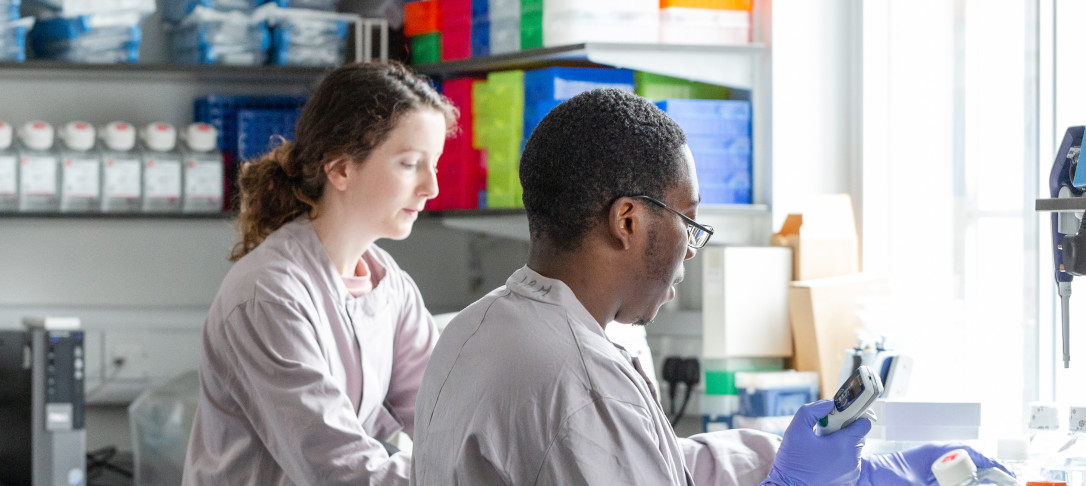
As the world confronts the COVID-19 pandemic, Imperial College London is playing a leading role in the global effort to respond to the crisis. Imperial academics are at the forefront of efforts to improve diagnosis, measure the likelihood and efficacy of herd immunity and understand how the pandemic has impacted healthcare systems.
Professor Nick Jennings, Vice-Provost (Research and Enterprise), will host a conversation between four innovative academics whose research has been accelerated thanks to funding received through the COVID-19 Response Fund. In a matter of months, they have developed their core research activity to answer key questions the world is asking about the crisis.
This is an opportunity for our community of alumni and friends to hear about the advances being made on the ground at Imperial. Join us live to put your questions to our panel of scientists who are leading the charge against COVID-19 and its impact on our health and healthcare systems.
All registered attendees will receive a recording of the event via email.
Showcasing world-leading research
|
How many people will be willing to take a COVID-19 vaccine? Dr Alex de Figueiredo, PhD, MSci, MSc Predicting and mapping acceptance of a COVID-19 vaccine and leveraging the pandemic to boost the UK’s perceptions towards routine immunisations A vaccine is seen by many as the silver bullet to ending the COVID-19 pandemic, but universal uptake of a COVID-19 vaccine cannot be assumed. In the UK, existing concerns over the safety, importance, and effectiveness of vaccines will likely combine with fears over a new vaccine, for which there is already considerable misinformation being communicated via online and offline channels. |
 |
|
Will avoidance of healthcare settings during the pandemic lead to a reduction in maternal vaccinations? Dr Beth Holder Pregnant women’s views and perceptions on maternal vaccination and use of vaccination services during the SARS-COV-2 (COVID-19) pandemic The COVID-19 pandemic has had massive collateral impact on the ability of healthcare systems to deliver normal clinical care. It has also led to avoidance of healthcare settings by patients. If this leads to a fall in vaccination rates, this could result in outbreaks of vaccine preventable diseases, undoing decades of progress. With the support of the COVID-19 Response Fund, we are carrying out a study on the impact of the pandemic on pregnant women’s perceptions of maternal vaccinations, and access to these vaccines in primary/secondary care settings. |
 |
|
Our white cells fight infections and they are master diagnosticians – can they tell us when a patient has COVID-19? Dr Jethro Herberg Diagnosis of SARS-CoV-2 (COVID-19) associated illness using Lacewing TECHnology (DISCO-TECH). SARS-CoV-2 infection can lead to many different clinical outcomes – and this presents a diagnostic challenge. Reliance on virus detection for diagnosis is imperfect – sometimes the virus is difficult to detect in infected patients, and in other patients the virus may have long gone even though it is still causing illness. How can we accurately identify patients with COVID-19, and tell them apart from those with other diseases with similar symptoms? This project aims to develop a point-of-care test based on detection of the body’s response to the virus, rather than on detection of the virus itself. To design the test, we are measuring the genes switched on or off in blood white cells from patients with the range of COVID-19-related conditions, and identifying host gene expression ‘signatures’ that characterise the range of COVID-19-related conditions. Through an inter-disciplinary collaboration between Imperial College departments of Infectious Diseases and Engineering, we will create a point-of-care diagnostic test using the Lacewing lab-on-chip platform, which can rapidly measure the key diagnostic transcripts in a handheld device. The final platform aims to deliver a cheap, accurate, geo-tagged diagnostic test for different presentations of COVID-19, that can guide diagnosis, treatment and surveillance in the ongoing COVID-19 pandemic. |
 |
| How many people have been infected with COVID-19, and are they still infectious?
Professor Graham Taylor Infectious or Infected: The burning question for SARS CoV-2 (COVID-19) screening |
 |
We’d like to thank the alumni and friends who donated to the COVID-19 Response Fund which made these research projects possible.